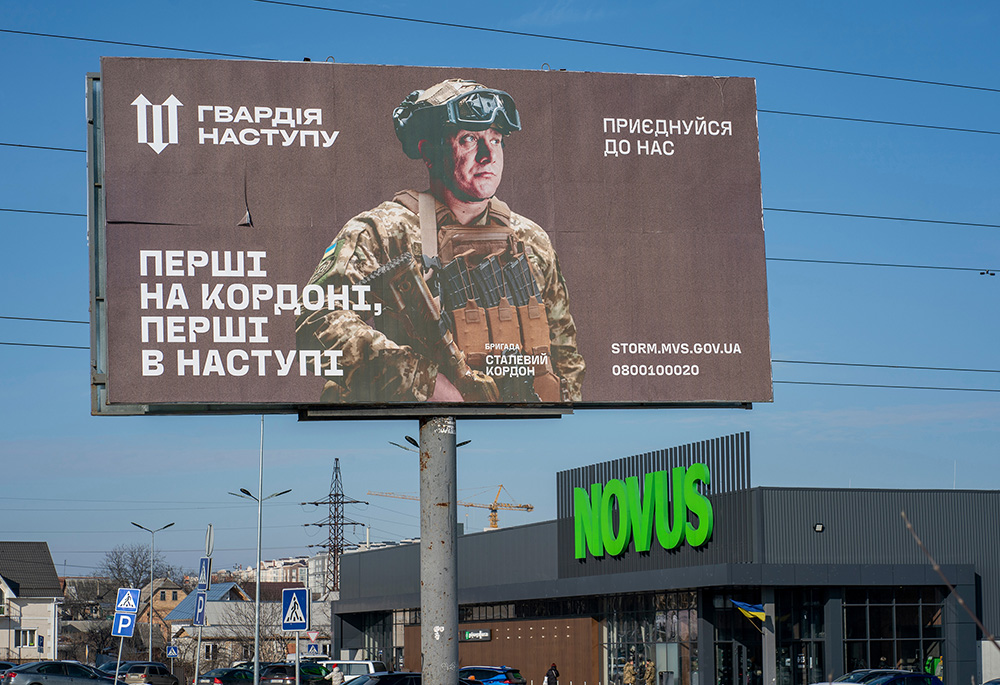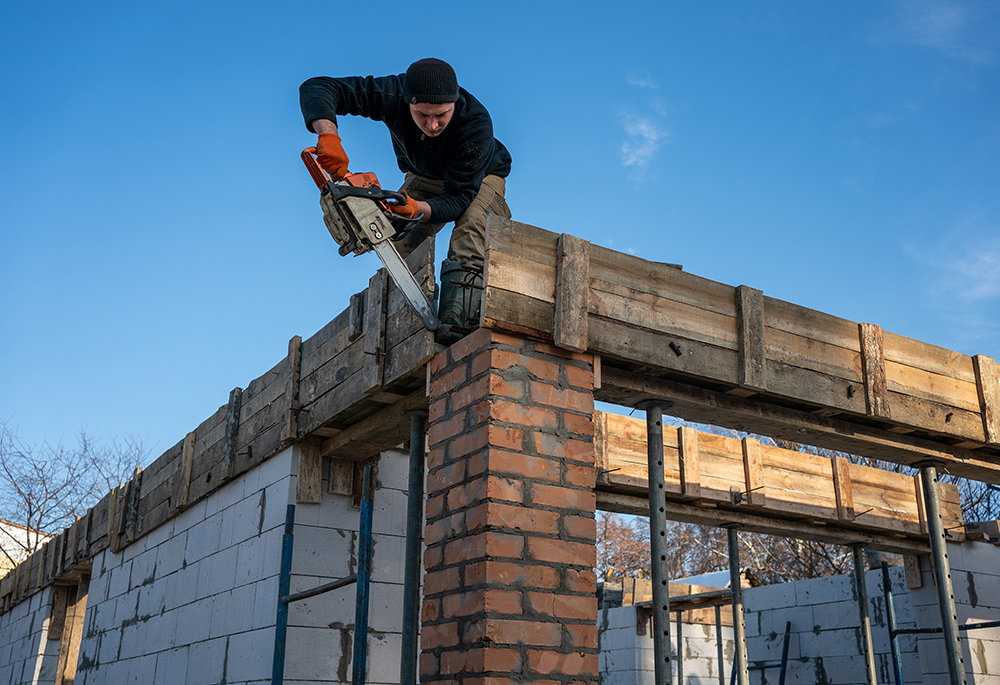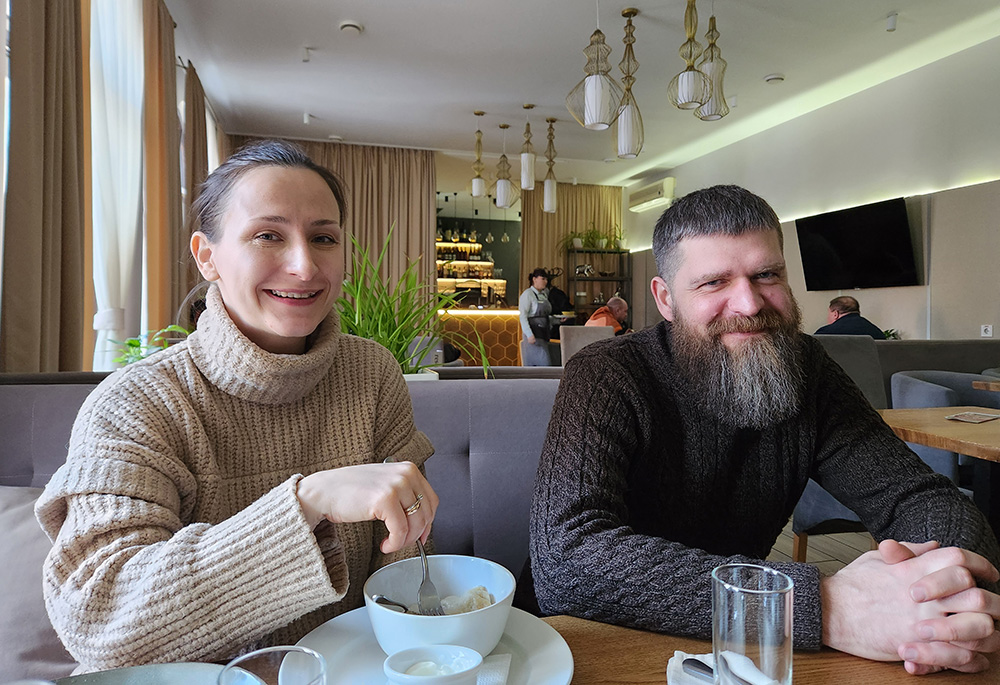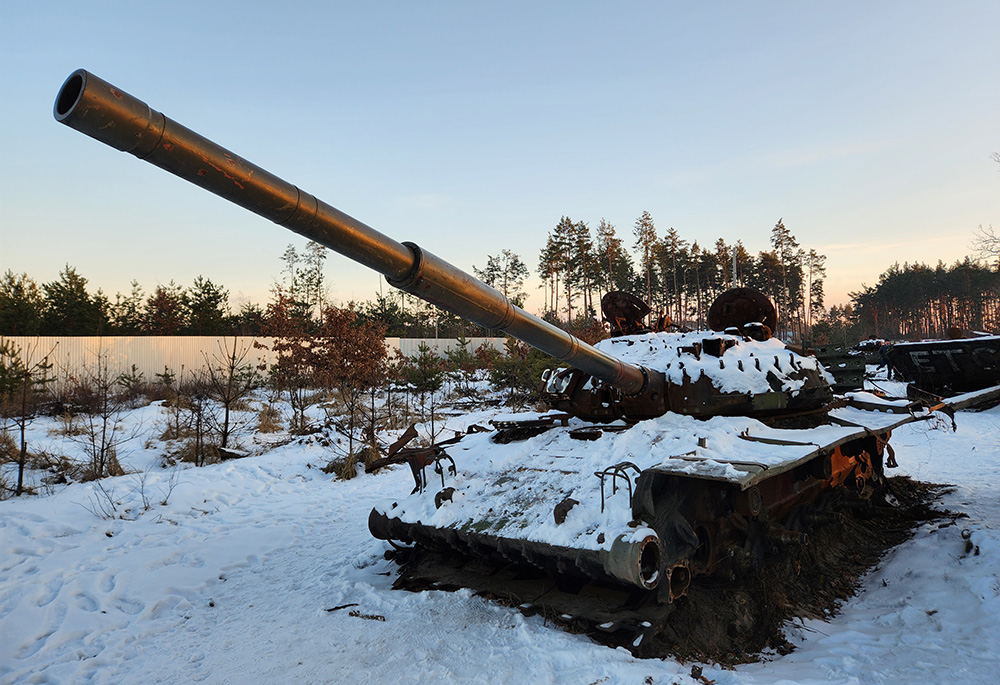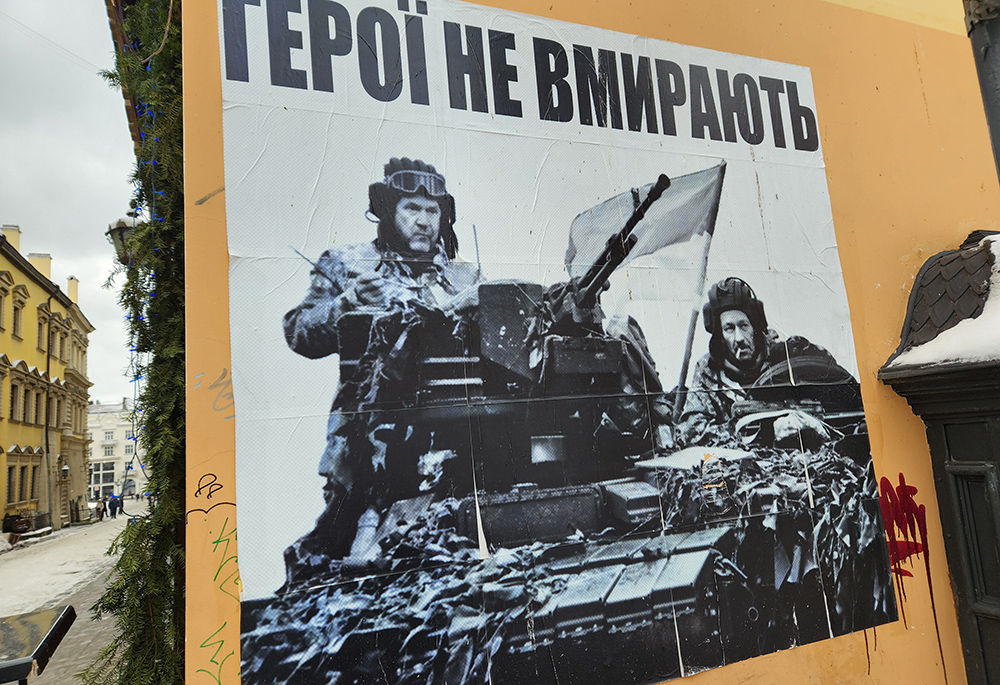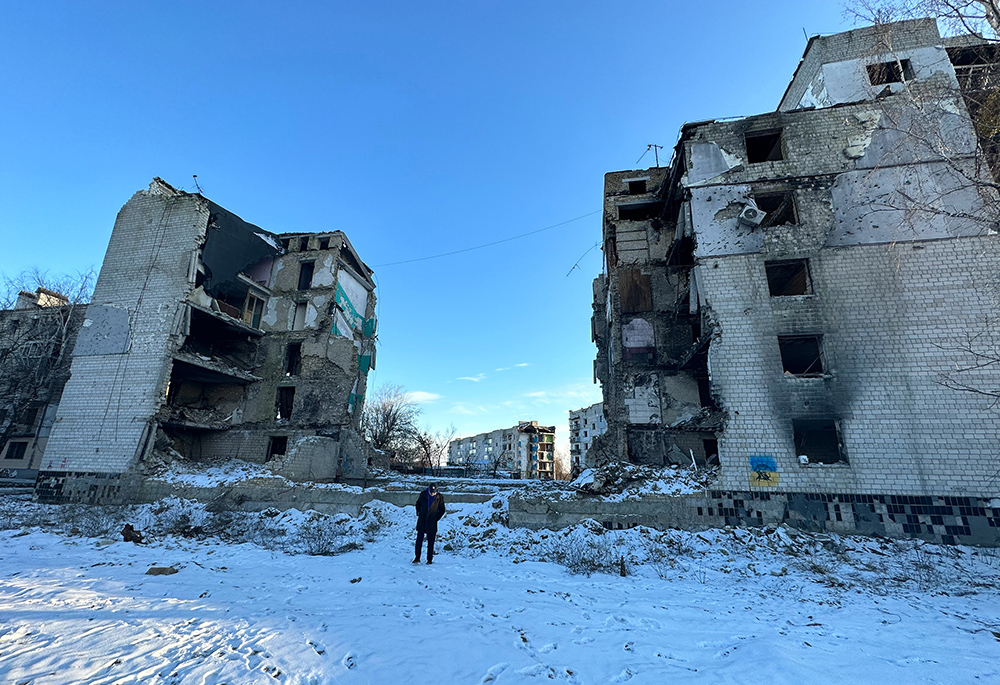
GSR's Chris Herlinger, in the center, walks near the center of an apartment complex in Borodyanka, Ukraine, which collapsed when it was hit by a Russian missile on April 5, 2022. (GSR photo/Gregg Brekke)
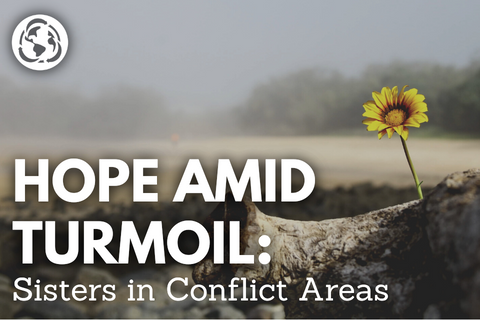
During my recent assignment to Ukraine, the war's relentless reach was evident even far from the front. While visiting Mukachevo, not far from the border with Slovakia, for example, my colleague Gregg Brekke and I heard air raid sirens for the first time.
While expected, they were still startling and cause for unease — as were poignant moments, like seeing young soldiers on railroad platforms, headed east to the front, saying goodbye to friends and family members. (I only saw male soldiers that afternoon but thousands of Ukrainian women are also serving at the front.)
Seeing the departing soldiers was a stark reminder of the costly, grave and tragic intrusion, even domination, of war on Ukrainian lives.
"Outside of Ukraine, the war is often portrayed as 'Who's winning, who's losing,' " one Dominican sister in Mukachevo told me. "But what's forgotten is the human cost."
Some of that cost became quietly apparent near Mukachevo, in a visit to the nearby town of Serednje. There, a local priest with ties to Dominican sisters and to Caritas is overseeing a project to expand housing for a group of displaced orphans and adults from the Russian-occupied city of Mariupol.
Our time with this group — 22 children and nine adults, crowded into a small, darkened two-story house — was all too brief. But I sensed that the residents were deeply traumatized.
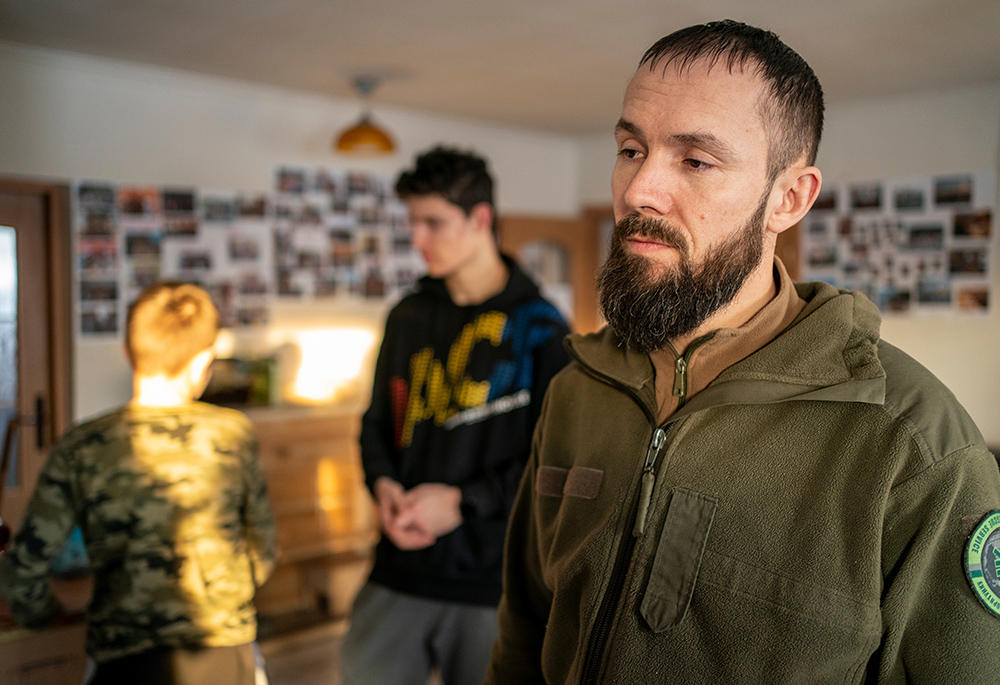
Volodymyr Zavadski, an army chaplain and leader of a group formed to help fellow displaced persons — displacement that dates back earlier than 2022 to the initial incursion of Russia in Crimea and eastern Ukraine in 2014 (GSR photo/Gregg Brekke)
That was confirmed by Volodymyr Zavadski, an army chaplain and leader of the group who has formed a charity to help fellow displaced persons — displacement that dates back earlier than 2022 to the initial incursion of Russia in Crimea and eastern Ukraine in 2014. (Ukrainians make clear that, for them, the war began in 2014, not in February of last year, which is why they call the events of the last year "Russia's full-scale invasion.")
Recalling the utter confusion and daily bombardments that drove him and others to leave Mariupol, Zavadski spoke plainly and starkly: "I'm totally lost. I have lots of friends who died in the army at the hand of the Russians. I've seen orphans. I feel lost. And I feel big, big pain."
Loss and displacement. Death and pain. Zavadski's comments felt as bracing as the biting wind from the snow-covered steppes near Serednje — air so frigid in the darkening late afternoon that my eyes watered.
Zavadski's sober observations helped frame the nearly 10 days we were in Ukraine — as did being in once-peaceful towns near the capital of Kyiv damaged and brutalized by Russian forces early in the war and only now recovering.
Thankfully, though, those were not the sole frames we experienced.
Stark reminders of war were nearly always offset, sometimes miraculously, by the resolve and solidarity, persistence and humanity, of those both suffering and those offering succor.
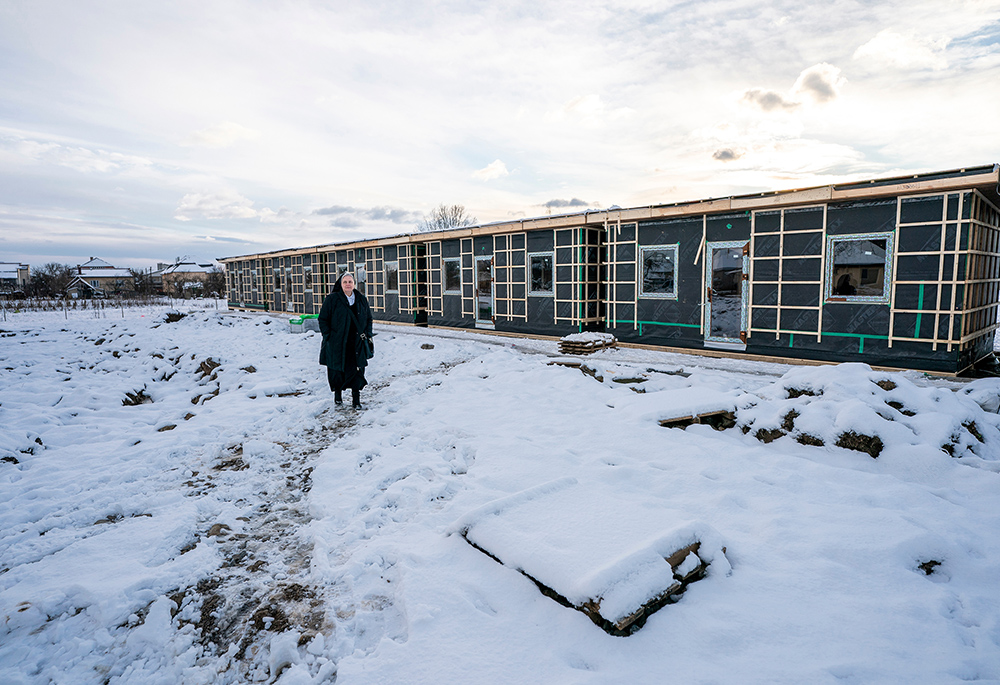
On a bitterly cold February afternoon, Dominican Sr. Edita Vozarova is seen during a visit to the nearby town of Serednje, where a project to expand housing for a group of displaced orphans and adults from the Russian-occupied city of Mariupol is under way. (GSR photo/Gregg Brekke)
Resistance and courage
In an environment where an invading country's blunt, searing and often unspeakable violence is met with small of acts of resistance and courage, the humility of sisters like Slovakian Sr. Edita Vozarova is both welcome and even healing.
Sister Edita and a translator, Natalia Kommodova, herself displaced first in 2014 and then in 2022, met Gregg and me in Kosice, Slovakia, and drove us into Ukraine. There we joined other members of the congregation, the Dominican Sisters of Blessed Imelda, who had kindly offered us to stay in their convent for a few nights.
Blessed with a wry sense of humor, and deep modesty — she put off an interview as long as she could — Sister Edita, 53, recalled that in the war's first days she was not sure what to do to help the Ukrainians crossing into Slovakia. An early gesture, she said, was offering freshly baked cake to the arrivals and making coffee for Order of Malta volunteers at the border.
"We didn't know what else to do at first," she said.
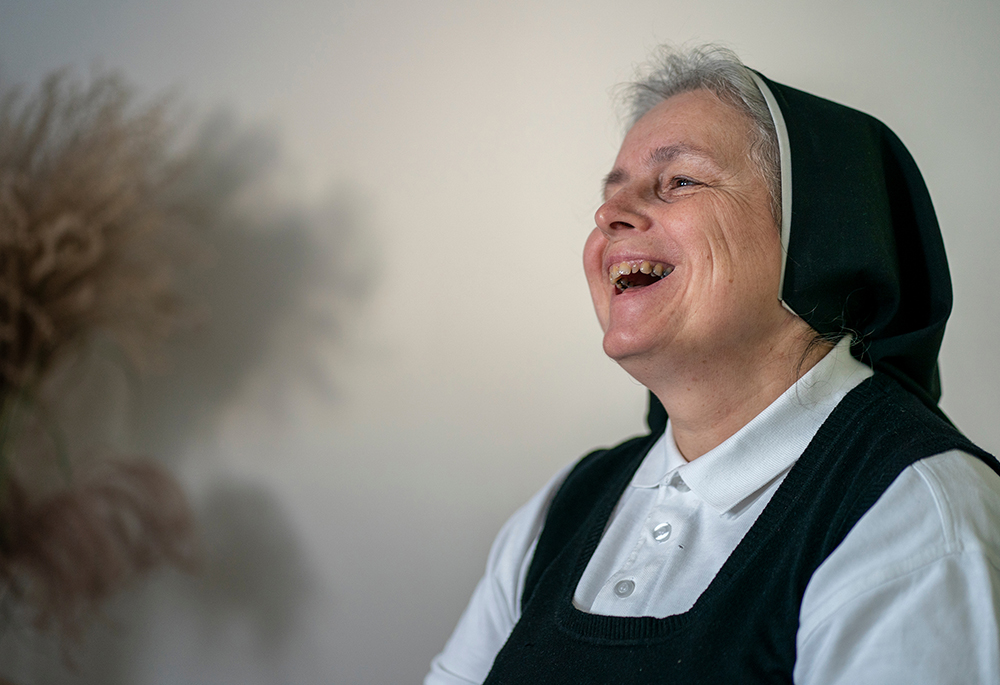
Slovakian Dominican Sr. Edita Vozarova is pictured during an interview at her congregation's convent in Mukachevo, Ukraine. She and other members of the congregation, the Dominican Sisters of Blessed Imelda, hosted GSR journalists Chris Herlinger and Gregg Brekke in February. (GSR photo/Gregg Brekke)
But in working with the volunteers as well as local parishes and Caritas, the sisters deepened their collaborations. As one example, she noted that ministries both in Mukachevo and across the border in Slovakia, like establishing kindergartens for displaced Ukrainian children, were made possible by the support of Dominican networks globally.
Other efforts: sending shoes and food to the front for Ukrainian soldiers; collecting clothing for the displaced, and offering refugees shelter for the first six months or so of the war. (Most of the families have since returned to Ukraine.)
"It has changed life in our community," Sister Edita told me of the sisters' lives at their convent in Kosice. "We are not used to children crying and laughing. But it gave us a lot of light and energy for our sisters."
For her part, Natalia, who is from the now-besieged city of Bakhmut in the Donetsk region of eastern Ukraine, said her family's "light and energy" come from the sisters. She, her children, ages 7 and 13, and her 83-year-old grandmother, also from Bakhmut, now live at the convent, while Natalia's husband works for a hydropower generating company north of the capital of Kyiv.
"Сooperation with the sisters gave me strength at the moment when I felt the weakest in all 37 years of my life," said Natalia, a journalist who assists the sisters with their humanitarian work.
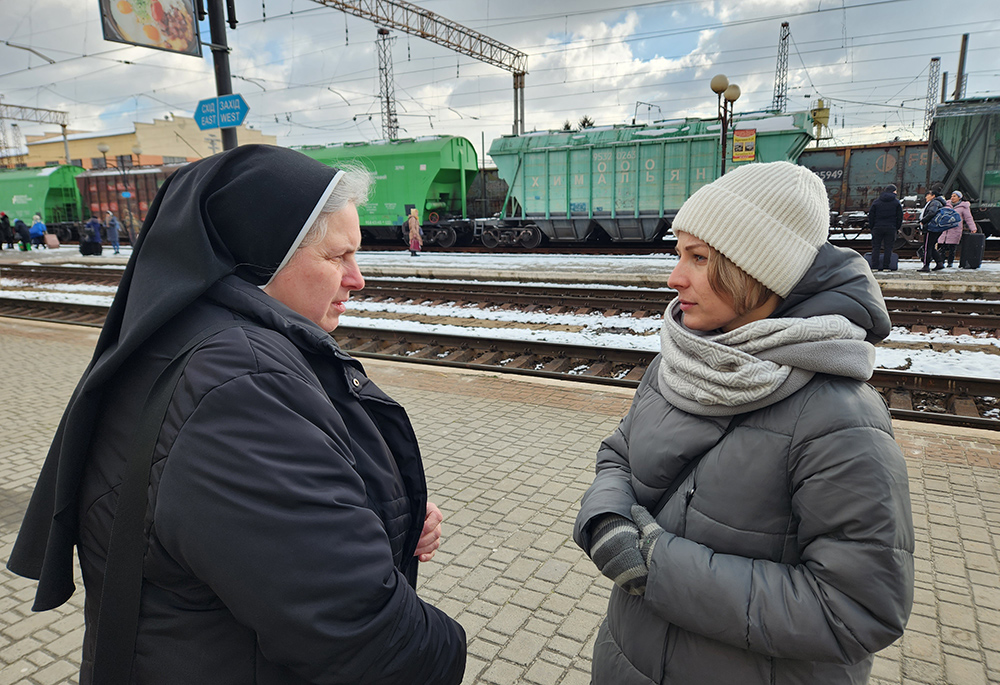
Dominican Sr. Edita Vozarova and a translator, Natalia Kommodova, herself displaced first in 2014 and then in 2022, see Chris Herlinger and Gregg Brekke off on the train platform in Mukachevo, Ukraine. (GSR photo/Chris Herlinger)
"When I didn't know if I was doing the right thing by staying in a foreign country, when it was difficult for me to survive the separation from my husband and my family, when my children were having a hard time being separated from their father," she said, "the Dominican sisters took them for walks, played games together, allowing me to be alone and make important decisions."
Natalia said she constantly feels the sisters' "prayers and support."
In a recent email, Natalia said that in "the convent of the Dominican Sisters of Blessed Imelda in Kosice, my faith became real," adding, "I don't know how our destiny will develop, but I'm just learning to feel again and hear the voice of faith."
Natalia and Sister Edita bid us farewell on the same railroad platform where we saw the departing troops. We didn't know what to expect next in Lviv, a city with a culturally polyglot past — at times Jewish, Polish and now Ukrainian — and a stop for those headed west to Poland and other countries during the first months of the war.
Some sense of normalcy was visible in Lviv, long cherished as a charming, cobblestone-lined traveler's destination. Despite the darkened streets at night, restaurants remained open, and a nightly curfew didn't seem terribly well-enforced.
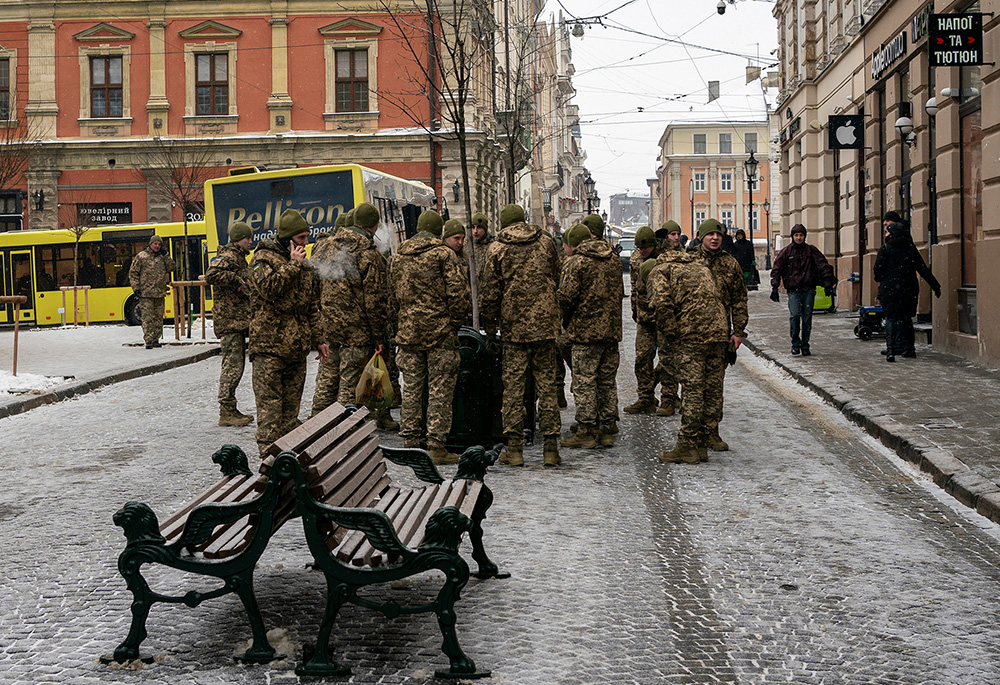
Young soldiers gather in the center of Lviv, Ukraine. (GSR photo/Gregg Brekke)
Yet idylls can be suddenly interrupted — and not only because of the constant hum of electrical generators heard on the city sidewalks. Turning a corner our first day, I ran into two Ukrainian soldiers brandishing Kalashnikov rifles.
The next day we saw a group of young — and I mean young — soldiers, none older than their mid-20s I would guess, grouping together in a city street. The same day we saw displays touting Ukrainian soldiers' heroism outside one of Lviv's handsome cathedrals — displays suggesting that the soldiers are blessed by saints.
In a nation experiencing war, though, there are always contradictions that complicate easy narratives. An interview one afternoon with a parish priest, a Franciscan sister and a lay Christian educator veered into uncomfortable territory on the issue of conscription.
The educator said that, from her Lviv parish, about two dozen young men have been conscripted. The sister and priest spoke of small numbers of young men hiding to avoid military service, and the priest said he has presided over two funerals for those who have died in battle.
Psychological stress
The toll this cumulative anxiety is taking on society is considerable. "The psychological stress is very big," the sister said. While all are trying to avoid panic, she said, no one can predict with any certainty what the next months will bring — though there is still a widespread belief that, ultimately, Russian forces will be defeated.
Still, the question hanging over society is a constant thrum — "What's next?"
That question took on more urgency as we got closer to the front. In Kyiv, the memories of a thwarted Russian takeover of the capital in the early days of the war remain raw.
Within days of the 2022 war's start, Russian tanks had entered Kyiv — a shock to residents like Sr. Yanuariya Isyk, a member of the Sisters of the Order of St. Basil the Great whose ministry is based in the capital.
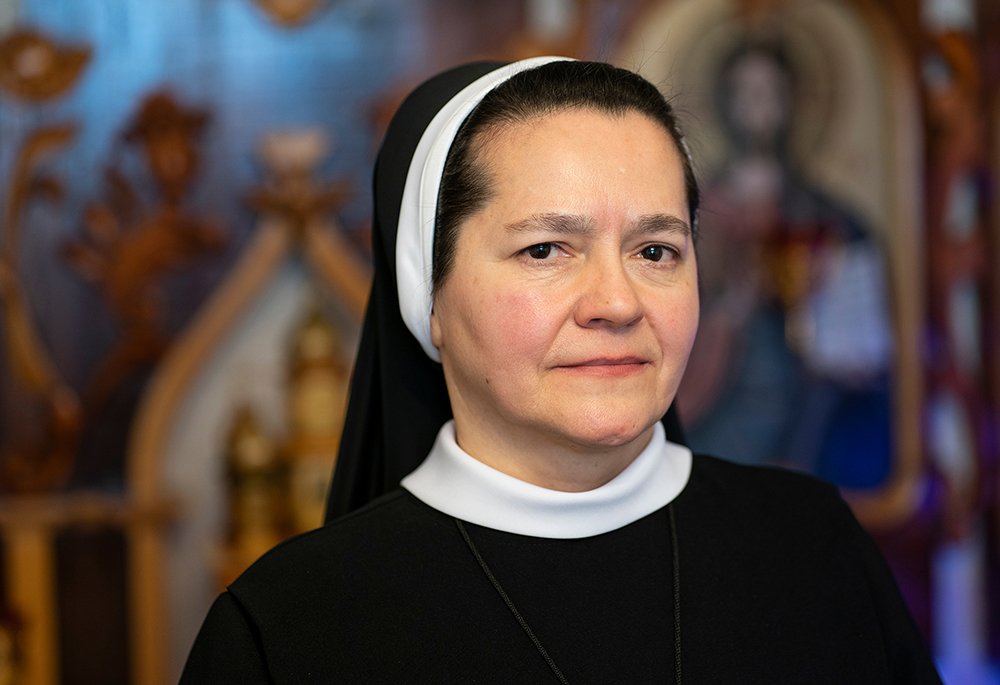
Sr. Yanuariya Isyk, a member of the Sisters of the Order of St. Basil the Great whose ministry is based in the capital of Kyiv, is pictured in the chapel of a small monastery apartment shared with two other sisters. (GSR photo/Gregg Brekke)
"I remember praying to God and asking, 'How did they arrive so quickly in Kyiv?' " she recalled, speaking animatedly at the small monastery apartment shared with two other sisters.
Though the Russian forces were quickly repelled, it is not easy for Sister Yanuariya to forget having to seek shelter, along with hundreds of others, at an underground parking area for a day.
Ultimately, it became safe to return home — though there were still Russian saboteurs in her neighborhood, causing Ukrainian troops to fire at them. That left a mark on Sister Yanuariya's apartment building, where a gaping bullet hole is still visible in a third-story stairwell.
At moments like that, Sister Yanuariya said, prayer — "living with faith," "living to trust God" — proved to be both a source of comfort and a lodestar of resilience. "It was like a challenge for us, but I learned to trust in God, knowing God will help us," she said. "He will do the best for us."
Sister Yanuariya related her experiences over plates of homemade cookies and cups of steaming tea and coffee — simple hospitality that is the norm in Ukraine but speaks to a wider sense of generosity, kindness and even solidarity.
Translator Iryna Chernikova, center, and her husband, Stas Nepokrytyi, left, sit with Sr. Yanuariya Isyk, a member of the Sisters of the Order of St. Basil the Great whose ministry is based in the capital of Kyiv, here in the small monastery apartment shared with two other sisters. (GSR photo/Gregg Brekke)
Something of that spirit is also apparent among those who are not avowedly religious.
The last third of our assignment — in and around Kyiv — could not have been accomplished without the help of Iryna Chernikova, 33, our translator, and her husband, Stas Nepokrytyi, 42, our driver. They are both Kyiv residents and are expecting their first child in about two months.
In the last year, the young couple have had to fully reorder their lives. Both lost livelihoods: Stas is an environmental attorney in a country where environmental law is not a priority now; Iryna is a furloughed flight attendant for the Ukrainian national airline. Because of the war, flights in and out of Kyiv are grounded.
Iryna and Stas spoke of their challenges over lunch at restaurant in Bucha — a city just west of of Kyiv best known for civilian atrocities committed by Russian troops last year. In Bucha we saw families reconstructing their homes — and, by inference, rebuilding their lives.
"Who knew Bucha would ever be famous?" Iryna said as we dug into bowls of hot bograch, a spicy Ukrainian soup. "It's all very sad," she said, sighing. "Life changes so fast."
We pondered something several people had told us in interviews — that Ukraine is now a damaged society, both physically and socially. Overcoming that challenge touches both the collective and individual. "How do you rebuild a life?" Iryna mused.
She paused. "The war is showing us who is who. Most people become helpful," she said, noting the solidarity shown by volunteers, and of neighbors helping neighbors. Some people even became heroic — joining the armed forces. "But others become thieves," she said of people trying to profit from the war. Iryna paused and repeated herself. "The war is showing us who is who."
The couple wants to be on the side of the angels — both volunteer with the Territorial Defense Forces, a kind of civilian national guard, and they are forming a charity to help war veterans and their families recover from the moral injury of war.
"People need psychological help — they are damaged inside," Iryna said. "Every day it becomes worse and becomes a bigger problem for our society." Stas picked up on that. "It is something we have to deal with now," he said.
But it will take time. The outskirts of Kyiv are littered with the detritus of war — abandoned Russian tanks sit rusting along the sides of roads, for example. More ominously, the imposing forests outside of the capital are now littered with land mines. It could take years — perhaps as much as a decade, Iryna said — before the armaments are all removed.
And searing memories are never far away. We passed the church in Irpin where the Orthodox priest who married the couple presided: Fr. Vladimir Bormashev died while helping evacuate local residents. "No one knows if it was artillery shelling or a mine that flew," Iryna said of the cleric's killing.
Advertisement
Our last full day in Ukraine was marked by hearing air-raid sirens, and learning that rockets were bound for Kyiv, launched by Russian forces in the Black Sea. "Maybe we'll see them on the way," Iryna said casually as we headed for a morning interview south of the capital.
A clear, cloudless blue sky enveloping an expanse of flatlands similar to the plains of the Upper Midwest greeted us. Fortunately, we didn't see any incoming rockets — though we did see soldiers along the highway at the ready with surface-to-air weapons.
"People are adaptable," said Slava Esmontov, a Protestant chaplain we met later that morning in the city of Bila Tserkva and who has shepherded humanitarian aid to the besieged areas of eastern Ukraine. "People get used to anything."
His colleague, Nita Hansen, an American Presbyterian laywoman who heads a charity which assists Ukrainians living with physical disabilities, agreed that humans are surprisingly adaptable. "It's not normal," she said of the current situation. "But it becomes normal."
That night, with air raid sirens in Kyiv blaring, we headed west on a 14-hour train journey to Warsaw. The trip required a stop the next morning along the Polish border for Ukrainian officials to query young Ukrainian men about their military eligibility.
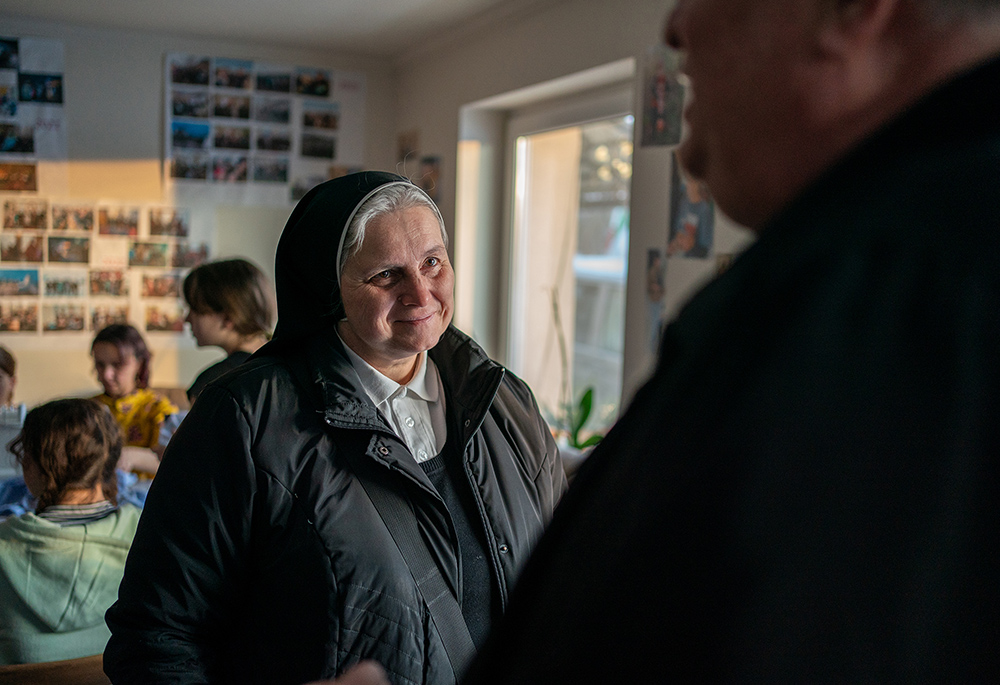
Dominican Sr. Edita Vozarova is pictured in a visit to the town of Serednje, near Mukachevo, Ukraine. Fr. Peter Zharkovskyi, right, a local priest with ties to Dominican sisters and to Caritas, is overseeing a project to expand housing for a group of displaced orphans and adults from the Russian-occupied city of Mariupol. (GSR photo/Gregg Brekke)
In a cramped sleeper car that dated from the Soviet era, I reflected about those we had met. I realized that none of them — sisters, a journalist, a priest, a teacher, an attorney, a translator, an army chaplain, humanitarian workers — would say they are in any way remarkable. Rather, they are simply doing their best in demanding, trying and even absurd situations — a new normal.
As we passed through stretches of stark, overcast landscapes, both in Ukraine and Poland, my thoughts strayed back to the early days of our assignment in Mukachevo. I recalled what Sister Edita told me about meeting the displaced community in Serednje. "We don't really have a collaboration with them yet," she said during our interview. "But I've been thinking since yesterday that maybe we can provide some pillows and dishes to help them."
I reminded Sister Edita that she had brought a crate of oranges for the residents. "Yes," her face brightening at the memory. "It's always nice for children to have some fresh fruit."
A small but thoughtful gesture. But in a country where war is now normalized, even that was an act of grace.

